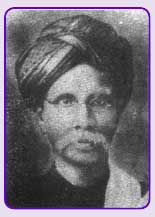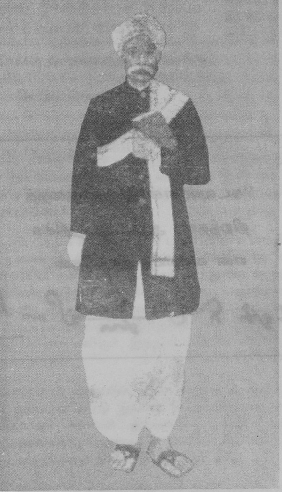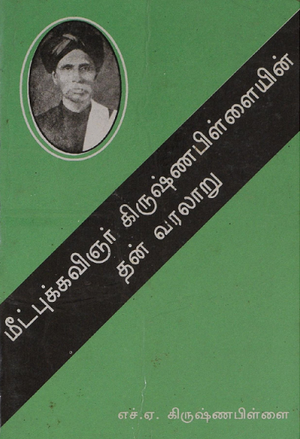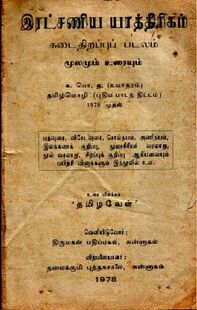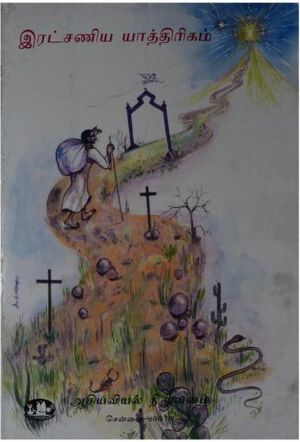Henry Alfred Krishna Pillai
இந்தப் பக்கத்தை தமிழில் வாசிக்க: எச்.ஏ. கிருஷ்ண பிள்ளை
Henry Alfred Krishna Pillai (H. A. Krishna Pillai) (Born on April 23, 1827 – Died on February 3, 1900) was a Tamil scholar. He was the author of the epic Christian book Ratchanya Yathrigam. He was the forerunner of many Christian songwriters in Tamil.
Birth, Education
Krishna Pillai was born on April 23, 1827, in a small town called Karaiiruppu near Rettiarpatti in the Tirunelveli district to a Vaishnavite family of Vellalar clan. His father was Sankara Narayana Pillai and mother, Deivanayakiyamma. Father of Krishna Pillai was highly talented in reciting Kambaramayanam as a series of discourses. Krishna Pillai traditionally learned Ramayanam, Mahabharata, Naalayira Divyaprabandham, Ashta Prabandham, Tiruvaimozhi, Sadagopar Anthadi from his father at an early age. Thiruparkadalnathan Kavirayar, who was a great Tamil poet, taught Nannool to Krishna Pillai.
Krishna's father died when he was sixteen. Thenceforth, he came to Palayamkottai and learned Tamil palm manuscripts from Vallal Venku Mudaliar, staying at his abode.
Personal Life
During that period, many Christian societies were engaged in religious charities in Tirunelveli area. Robert Caldwell carried out religious works for the Biblical Society. Many schools were established in towns with the support of Christian associations. In Sawyerpuram, G.U. Pope started a college. Caldwell was in lookout for a Tamil teacher for the college when Pope went to England for rest. Twenty-five-year-old Krishna Pillai, one of the three applicants for the post, was hired by Caldwell on 1853 as a Tamil teacher at Sawyerpuram College as he was proficient in Tamil literature and grammar.
Marriage
Krishna Pillai marrierd 9 years old Muthammal at his 14 the age.
Conversion
Krishna Pillai became involved in Christianity while he was working as a teacher. Already, a few of Krishna Pillai's relatives including his younger brother Muthaiya Pillai had converted to Christianity. Krishna Pillai began to study Christian scriptures. At the age of thirty, on 18 April 1858, he was baptized at the Mayilai St. Thomas Church ,Chennai and became a Christian by the name of Henry Alfred Krishna Pillai. Few years after his wife and three children along with his mother also converted in to Christianity.
Other Vocations
Krishna Pillai created a cofee plantation at Courtalam while he was working at Palayamkottai. From 1890 to 1891 he ran a salt making unit at Kulasekaran pattinam, Tirunelveli District.
Journalism
Krishnapillai moved to Chennai on 1857 and worked as an assistant editor of the daily Dinavarthamaani in Chennai run by Rev Peter Percival.
Teaching Work
Krishana Pillai worked as a Tamil Teacher at Sayarpuram school from 1853 to 1876. From 1876 he worked as professor of Tamil in the Palayamkottai C. M. S. college. From 1886 he worked as a Professor of Tamil at the Maharaja's College, Thiruvananthapuram. Manonmaniyam P. Sundaram Pillai, who worked in the Department of Philosophy at the same college, became a friend of Krishna Pillai. He was at Trivandrum till 1990.
He also served as the editor of the Christian Literary Society.
Literary Contribution
Almost all of Krishna Pillai's works are about Christian faith and theology. He started to write a Christian epic Rarchanya Charitham on 1860 , but not completed it. On 1865 he edited and published a small poetry book named Vedhaporul Ammanai by Vedhamanikkam Nadar, one of the the first christian converts from Kanyakumari District.
During his time of reading Christian texts, Krishna Pillai became very interested in 'The Pilgrim's Progress', a book written by John Bunyan (1628-1688). He felt that the book exemplifies his life and experience. Based on that two-part book, he composed the Ratchanya Yathrigam. Without translating the original text as it is, he wrote it as an important piece of work of the Tamil Christian tradition, incorporating elements of Tamil culture. He started the work on 1878 and completed on 1892
He authored a book, Ratchanya Manoharam, which contains hymns to praise the Lord, and wrote a collection of hymns entitled Thiru Akaval and Ratchania Saritham. He wrote a grammar book called Ilakkana Soodamani and a biographical book on how he became a Christian—Naan Christhuvai Kanda Varalaru (How I discovered Christ). Likewise, he has also authored a literary collection, Kaviya Dharma Sangiraham.
Ratchanya Kural and Ratchaniya Bala Bodanai are books that are no longer available.
Literary Contribution
Krishna Pillai is considered one of important Tamil poets of 19th centuaryl. His Ratchanya yathrigam is considerd as a major Christian epic in Tamil after Thempavani by Veramamunivar. Amy Carmichael, a student and critic of Krishna Pillai, describes his devotion transcending into poetry as below: "ideas after ideas, words after word streamed (from him) as if too eager to say untold stories... as if a sky with numerous stars shining like the sun opened above him'
Death
Henry Alfred Krishna Pillai passed away on February 3, 1900, at the age of 73.
Biographies
- The Tamil Christian Poet -A.J.Appasami
- The lif and Times of H.A.Krishna Pillai -(1827-1900) Dennis Hutson
- H.A.Krishna Pillai- Paul Kadambavanam 1924
- Mahavidvan H.A.Krishna Pillai - J.S.Masilamani Iyer 1927
- Christuva Kamban H.A.Krishna Pillai. T.G. Thanngarasanar 1958
- Meetpukavinjar Krishna PiIllai thanvaralaRu - V.Gnanasikhamani
Works
Books by Krishna Pillai: [1]
Poems
- Pottri Thirukal Akaval 1884
- Ratchanya Yathrigam 1894
- Ratchanya Manoharam 1899
Prose texts
- Ilakkana Soodamani 1883
- Naan Christhuvai Kanda Varalaru 18893
- Ratchanya Samaya Nirnayam 1898
Book Collection
- Kaviya Dharma Sangiraham
- Ratchanya Kural
- Ratchanya Bala Bodanai
Publiser
- Vedhaporul Ammanai -Vedhamanikkam Nadar 1860
- Bharathakanda varalaru - Robert Caldwell.1865
Reference
Footnotes
✅Finalised Page
First published on:
03-Oct-2022, 19:33:31 IST
